My First Visit To My Birthplace, The Village Neret Near Lerin in Aegean
Macedonia
By Atanas Strezovski
 printable
version
printable
version
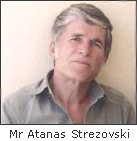 I
am Atanas Strezovski, an Australian citizen and passport holder. In
July 2003, while on holiday in Europe, I decided to visit my birthplace
to see my relatives and friends and to be present at the wedding of
the daughter of aunty, Georgiou Elefterija.
I
am Atanas Strezovski, an Australian citizen and passport holder. In
July 2003, while on holiday in Europe, I decided to visit my birthplace
to see my relatives and friends and to be present at the wedding of
the daughter of aunty, Georgiou Elefterija.
While in Bitola, the Republic of Macedonia, I had received an invitation,
written using the Greek alphabet to make Macedonian words. The letter
said that I would be welcome “dear nephew” to attend the wedding
of Hrisula and Atanasios and that they would wait “with warm heart”
for me to arrive.
On my first attempt to return to Greece for a visit in August 1994
I had been denied entry - the border official told me this was because
my passport had my birthplace as “Neret” and the country as
“MKD”. Neret is the original Macedonian name for my village,
and MKD is the international abbreviation for Macedonia. However, after
the Balkan Wars the region became part of Greece and the village was
renamed into the Greek “Polipotamos”. The border official
said that there was “no way” I could enter Greece while the
terminology “Neret” and “MKD” were in my passport.
On this occasion, because I had the invitation, I had a small hope
that the Greek authorities would permit me to enter Greece when I arrived
at the border checkpoint at Medzitlija. To encourage me, my mother,
Paraskeva, who was also born in Neret but now lives in Bitola, had said
to me that many people had been let into Greece because they had such
an invitation. But I later realized that the invitation was irrelevant
to the Greek authorities.
I made a deal with a Macedonian taxi driver that he would take me to
the village Neret for 25 euros.
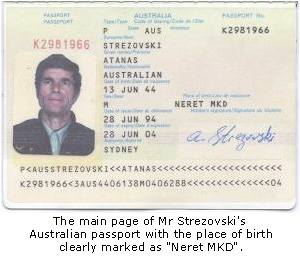 We
set out at 8.30 am. The whole time I was afraid that they would not
let me into Greece, as I know that many Macedonians born in Aegean Macedonia
(now called northern Greece) have been wiped out from the records forever
by the Greek authorities.
We
set out at 8.30 am. The whole time I was afraid that they would not
let me into Greece, as I know that many Macedonians born in Aegean Macedonia
(now called northern Greece) have been wiped out from the records forever
by the Greek authorities.
Despite the history and my own experience in 1994, I kept my small
hope that they would let me enter. On the way, the owner of the taxi
said that many hundreds of Macedonians with Australian and Canadian
passports had been denied entry at the border simply because their birthplace
was written under the original Macedonian name, for example “Buf,
Makedonia”. According to the taxi driver, the Greek Government
does not want to see Macedonian names and that is why they turn people
back. The Government wants to see these toponyms written only under
the new Greek names with which they had Christened them.
He said that when the Macedonians were denied entry they became very
unhappy and that as a taxi driver he was also unhappy as the passengers
paid for their journey but had not reached their destinations. What
the Greeks are doing is very unfair, he said, but they are very powerful
internationally and what can the Macedonians do? He then added that
he has two Greek border officers who are good friends of his and that
if one of them is on duty there is a small possibility that I could
pass through. Otherwise there would be no chance at all, he said.
About 9 am we reached the check point, Medzitlija. He told me to wait
in the taxi and he would test the ground for me. A few minutes later
he returned and said it was successful.
When I saw the stamp in my passport, I was surprised that I would be
allowed to pass the border, as I could clearly remember not being allowed
to pass through in 1994. I could not believe the situation. I was overjoyed.
As soon as we started the car, I said to the taxi driver “The
ice is broken, the times are softer, and even the Greeks can see that
the Macedonians are people too. This is probably because of criticism
and pressure from human rights organizations and the European politicians
and community.” The young taxi driver said “Do not be so happy
until the job is done and we reach your village.” The driver said
that although he had been to many villages, this was the first time
he was going to Neret. We would need to ask directions from somebody
and, as there were a lot of Greek agents in plain clothes, to be on
the safe side we would need to ask in the Greek language and to ask
for the village using its Greek name. “Pujse to Polipotamos”
he said to me in Greek to show me how, as I was on the footpath side
of the car.
And that is what happened. When we met a women, I said the above words
and she answered something in Greek which I did not understand. But
the taxi driver told me even if I do not understand what she is saying,
she was showing with her hand that we need to turn right at the T junction.
We continued on for another 10 minutes. But to ensure we were going
in the right direction, we stopped again and asked a man who was plastering
a house - using the same Greek words above. His short answer - in perfect
Macedonian - was that we were on the road to the village Neret (“pa
Vie patuvate za selo Neret”). With a similar short reply - also
in Macedonian - I said to him with a smile “Yes, we are going there.”
("Da, tamu odime.”) He gave us precise directions. “Turn
left at the third bridge. It is the last village. You cannot miss it.”
In 15 minutes we arrived at the village Neret. At once I was greeted
by my relatives, my aunty Elefterija and my cousins Dimitrios and Vasili
Tolis.
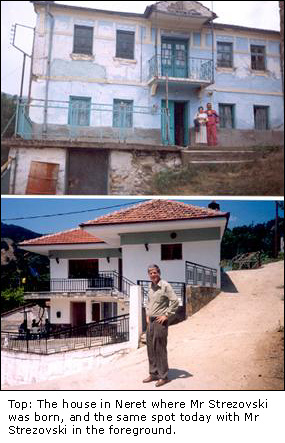 The
wedding was underway when we arrived. The band played Macedonian and
Greek music. But there was only music - no singing. Even well known
Macedonian national songs, such as “Mariche Le Lichno Devojche”
(Maria You Pretty Girl) were only played by the band but no one sang
to the music.
The
wedding was underway when we arrived. The band played Macedonian and
Greek music. But there was only music - no singing. Even well known
Macedonian national songs, such as “Mariche Le Lichno Devojche”
(Maria You Pretty Girl) were only played by the band but no one sang
to the music.
Until 4 pm the ceremonies were only in the centre of the village. Around
3 pm I went to the church to speak with the priest. There was no sign
of the name of the church - not in Macedonian nor in Greek. I asked
the priest but he refused to answer. He seemed frightened. I asked one
of the guests near me “What is the name of this church?” The
lady replied “Sv Bogorodica” (St Mary). I asked why there
is no name on the church? Why it is blank? She said “We know the
name”. When I asked the priest if the church is called Sv Bogorodica
he said “Yes” in Macedonian, but made no further comment.
But the service in the church was entirely in the Greek language.
 Outside
the church and in the village, when there were no Greeks present, the
people generally spoke Macedonian, so my impression was that the Macedonian
language at least is no longer forbidden. However, it is a shame that
there is no Macedonian school and that the Macedonian language is not
used or taught at school.
Outside
the church and in the village, when there were no Greeks present, the
people generally spoke Macedonian, so my impression was that the Macedonian
language at least is no longer forbidden. However, it is a shame that
there is no Macedonian school and that the Macedonian language is not
used or taught at school.
That evening in the nearby town of Lerin, in the hall where the wedding
celebrations continued, the band played Macedonian music but the words
were sung in the Greek language.
After the wedding we returned to Neret and I stayed with my cousin
Dimitrios.
The next day I awoke about 10 am. I was alone in the house. I looked
at the photograph albums, which my cousin had already pointed out to
me.
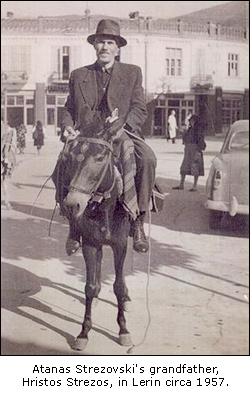 Most
of the photographs were of my relatives, and I saw photographs of my
dead grandfather, Hristos Strezos. I also saw photos of his son, my
uncle, Kosta Strezov, who now lives in the town of Burgas in Bulgaria.
It was Kosta who had originally told me about this wedding and suggested
I try to enter Greece to attend. Kosta had previously not been allowed
to enter Greece and so on this occasion had not tried to enter to attend
the wedding.
Most
of the photographs were of my relatives, and I saw photographs of my
dead grandfather, Hristos Strezos. I also saw photos of his son, my
uncle, Kosta Strezov, who now lives in the town of Burgas in Bulgaria.
It was Kosta who had originally told me about this wedding and suggested
I try to enter Greece to attend. Kosta had previously not been allowed
to enter Greece and so on this occasion had not tried to enter to attend
the wedding.
I also saw a photograph of my grandfather’s other son, my father,
Giorgi Strezovski. I was in the photograph, a child of about four sitting
on his knee. The photo was taken in Bitola in about 1948. I was born
in 1944 and my family had left Neret and gone to Bitola while I was
a baby. My father was a patriot. He had told my mother that if we stayed
in the village we would become Greeks but if we left we would have a
chance to remain Macedonians. Many other Macedonians in Greece had felt
the same.
 I
believe that as a Macedonian intellectual my father was persecuted by
Serbian nationalists. My father was a professional musician, a clarinet
player and composer, but in the photograph he was wearing a Yugoslav
army uniform. Because of the split between Tito and Stalin, he was imprisoned
for about three years in Serbia during the time of the “Informbiro”.
His health deteriorated through maltreatment, and the prison doctor
diagnosed that he would soon die. They let him free so that he would
not die in the prison hospital. From Serbia he moved to Bitola and then
Skopje but no doctor could help him and he passed away.
I
believe that as a Macedonian intellectual my father was persecuted by
Serbian nationalists. My father was a professional musician, a clarinet
player and composer, but in the photograph he was wearing a Yugoslav
army uniform. Because of the split between Tito and Stalin, he was imprisoned
for about three years in Serbia during the time of the “Informbiro”.
His health deteriorated through maltreatment, and the prison doctor
diagnosed that he would soon die. They let him free so that he would
not die in the prison hospital. From Serbia he moved to Bitola and then
Skopje but no doctor could help him and he passed away.
 I
also saw my mother, Paraskeva Strezovska, with her sons Lenin and myself,
Atanas, photographed in Ohrid, although I do not know in what year.
I was about 10 years old.
I
also saw my mother, Paraskeva Strezovska, with her sons Lenin and myself,
Atanas, photographed in Ohrid, although I do not know in what year.
I was about 10 years old.
I also saw a photograph of myself as a Serbian soldier in the Yugoslav
National Army. The photo was dated 25.10.1964.
I also saw a photograph of my cousin, Toli Dimitrios, dressed as a
Greek ‘Evzon” guard.
At my request, my cousin, Vasili Tolis, took me to the monastery Sv
Luka, where there are the graves of my relatives, including that of
my grandfather Hristos Strezos, who died in 1975. The family believes
this was from beatings by Greek agents whom the Macedonians call “andarti”.
We believe the reason is that he received a letter from Australia which
was addressed to Risto Strezovski and not Hristos Strezos, the Greek
version of his name.
 I
also saw the graves of my cousin Hristos Tolis and his wife Fane Filippoi,
for whom I lit candles.
I
also saw the graves of my cousin Hristos Tolis and his wife Fane Filippoi,
for whom I lit candles.
Again, in this monastery also, I could see no writing to indicate its
name.
In the village cafe, I met with a group of Macedonians who spoke in
Macedonian. I joined the group and they accepted me. I told them I was
born in the village but had left as a baby and this was the first time
I had come back in 59 years.
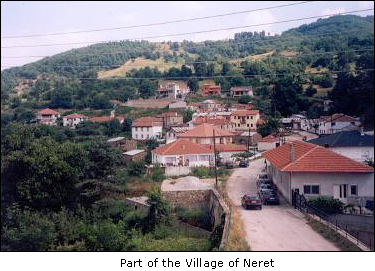 They
asked to see my passport and when they saw written the word “Neret”
they were surprised and said how good it was that I could successfully
enter Greece. I told them the story of the taxi driver.
They
asked to see my passport and when they saw written the word “Neret”
they were surprised and said how good it was that I could successfully
enter Greece. I told them the story of the taxi driver.
They mentioned that even a letter which has Macedonian script or names
and surnames is not delivered. They believed such letters are returned
to sender but I believe they could be kept by the Greek authorities
or even destroyed.
After three days the time came for me to leave for Bitola. Around 5
pm I said my goodbyes to my relatives, and my cousin Vasili took me
to the border at Medzitlija.
On the way my cousin said he would bring me to Lerin to see my grandfather’s
old shop where he practised as a tailor. My father also worked there
as a boy before he became a musician. The shop has been closed since
the late 1920s or early 1930s when my grandfather travelled to Australia
to look for work. The shop looks as it was then and I took several photographs.
 We
started again for Bitola and my cousin said to me “Oh cousin, Tanase,
if you had stayed here instead of emigrating you would have a house
in Neret, a farm in Neret, and a shop in Lerin. Because your family
was not here your grandfather Hristos gave everything to us and made
us promise we would not sell the shop to anyone.” I did not have
a comment to this, except to say “Good luck to you for your inheritance
and may you have a happy life. If I have another chance in my life time
I will come back again. All I want is for us to be healthy and happy.”
We
started again for Bitola and my cousin said to me “Oh cousin, Tanase,
if you had stayed here instead of emigrating you would have a house
in Neret, a farm in Neret, and a shop in Lerin. Because your family
was not here your grandfather Hristos gave everything to us and made
us promise we would not sell the shop to anyone.” I did not have
a comment to this, except to say “Good luck to you for your inheritance
and may you have a happy life. If I have another chance in my life time
I will come back again. All I want is for us to be healthy and happy.”
At the border, I wanted to make my farewells and to continue alone,
in case there was some problem at the check point which I did not want
my cousin to suffer. But my cousin said he would take me to the Macedonian
border.
At that moment I had a feeling that something unexpected could happen.
But my cousin insisted with the words “Don’t worry. I was
an evzon guard here and everyone knows me.”
When I gave my passport to the Greek official, he opened it and carefully
read every part. He looked aghast and said “Selo Neret”.
As he said the Macedonian word “Selo”, which is nowhere in
the passport, I immediately realized that he may be of Macedonian background.
The possibility that he could be reminded me of a “Janichar”,
a Turkish word from the Ottoman period that meant a Macedonian child
who had been confiscated from their parents and raised as a soldier
to kill Macedonians.
I got a feeling that I would have a problem. I was mostly worried about
my cousin Vasili as I would be returning to Australia but he would remain
there.
The official asked me in Greek “What is Neret?” and what
is “MKD?”. I shrugged my shoulders and as I do not speak Greek
I answered to my cousin in Macedonian so that he could translate “I
do not know”, even if I did know.
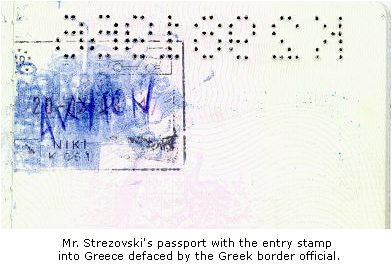 He
rolled the passport nervously in his hands. He made a phone call and
looked up some books, ostensibly to find out what “Neret”
and “MKD” mean, although I believe he already knew what they
meant. I waited for about an hour at the counter. Meanwhile a number
of people with Greek passports passed through trouble-free at the same
window. As I waited on my feet I began to feel I was being punished.
The officer held his head with both hands and looked as if he could
not believe what he was reading. I wondered how a person including myself
could have passed the check point and not have been checked properly.
Clearly there had been some sort of “error” by the officer
who had allowed me to enter Greece. I felt that the officer could get
into serious trouble for allowing me in, and I felt sorry for him as
what he had done was right from a humanitarian point of view. Meanwhile
the officer I stood before still could not believe what he saw and continued
to fidget with the passport. Finally he asked me when and how I entered
Greece and who had let me in? My answer through my cousin who translated
was that I did not know which officer it was but that I passed through
the same road on which I now wished to leave. I told him the date and
the time and that now two days later I am waiting patiently to leave
as relatives of mine were on the Macedonian side of the border with
a car.
He
rolled the passport nervously in his hands. He made a phone call and
looked up some books, ostensibly to find out what “Neret”
and “MKD” mean, although I believe he already knew what they
meant. I waited for about an hour at the counter. Meanwhile a number
of people with Greek passports passed through trouble-free at the same
window. As I waited on my feet I began to feel I was being punished.
The officer held his head with both hands and looked as if he could
not believe what he was reading. I wondered how a person including myself
could have passed the check point and not have been checked properly.
Clearly there had been some sort of “error” by the officer
who had allowed me to enter Greece. I felt that the officer could get
into serious trouble for allowing me in, and I felt sorry for him as
what he had done was right from a humanitarian point of view. Meanwhile
the officer I stood before still could not believe what he saw and continued
to fidget with the passport. Finally he asked me when and how I entered
Greece and who had let me in? My answer through my cousin who translated
was that I did not know which officer it was but that I passed through
the same road on which I now wished to leave. I told him the date and
the time and that now two days later I am waiting patiently to leave
as relatives of mine were on the Macedonian side of the border with
a car.
The officer seemed exhausted from asking me the same questions over
and over and did not know what else to ask me. Finally he gave back
the passport. I thanked him and quickly left the building.
As I opened the car door and was about to sit, I saw an officer, a
large man with a uniform, coming towards me. Unlike the other officer,
he had a pistol on his hip. He spoke in rapid Greek, of which I could
only understand the word “passport”. Immediately I understood
the problem and gave him the passport. He entered the checkpoint office
from which I had just left.
I waited on the footpath for about seven minutes. The large officer
then returned and gave me the passport. I thanked him in English.
We entered the car and left immediately for the Macedonian border.
I wondered why the large officer had taken my passport when the first
officer has already cleared me to leave. As we were driving I opened
the passport to see if there had been any changes. I saw that the stamp
for my entry into Greece had been badly smudged with blue ink so that
the Greek words were no longer identifiable. There was also some new
handwriting - the word “AKYION”, presumably a Greek word.
I also noticed that there was no stamp for my exit.
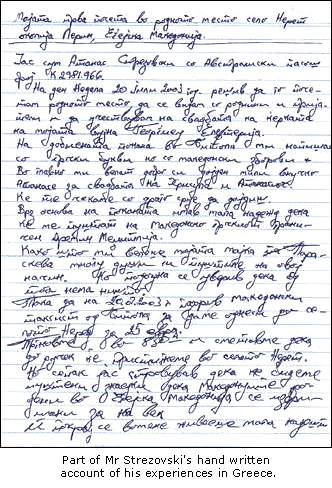 In
those moments I asked myself what all this meant? Whether that by destroying
my entry stamp it made it look as if I had entered Greece illegally,
perhaps by jumping the fence or crossing some farmland or bush etc,
rather than having passed through the checkpoint? Was that the reason
for defacing the passport - to destroy the evidence that I entered Greece
legally? However I did not believe that they could fully destroy the
evidence of my legal entry as surely the information would have been
entered in their computer system?
In
those moments I asked myself what all this meant? Whether that by destroying
my entry stamp it made it look as if I had entered Greece illegally,
perhaps by jumping the fence or crossing some farmland or bush etc,
rather than having passed through the checkpoint? Was that the reason
for defacing the passport - to destroy the evidence that I entered Greece
legally? However I did not believe that they could fully destroy the
evidence of my legal entry as surely the information would have been
entered in their computer system?
I decided I would take action to make these events known to various
Macedonian human rights organizations in Bitola and Sydney and to the
Australian Department of Foreign Affairs in Canberra.
A year later I am still asking myself - what is the real problem? Is
it that I entered Greece under my original Macedonian name and surname;
is it that I entered Greece under the original Macedonian name of my
village - Neret, instead of the Greek Polipotamos as they have renamed
it; or is it that I entered Greece with the international abbreviation
for Macedonia - MKD. I think it is that any or all three of the above
would signify official recognition for the Macedonian people and country.
Sydney, June 30, 2004
See also: Photo: Strezov family
Mr Strezovski features in the song Bolka
za Neret.
Source: www.pollitecon.com
